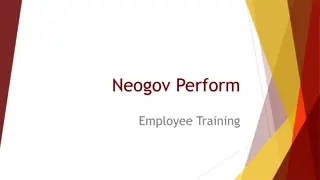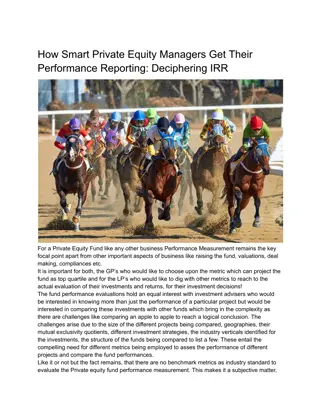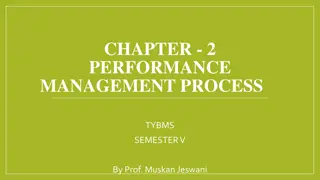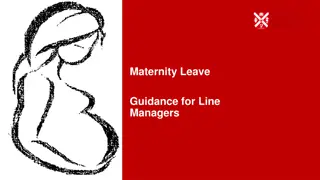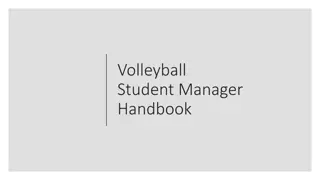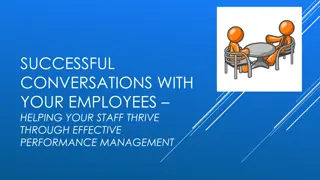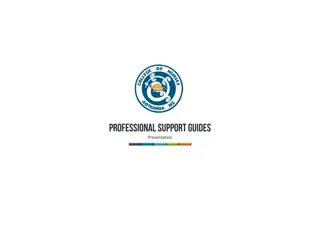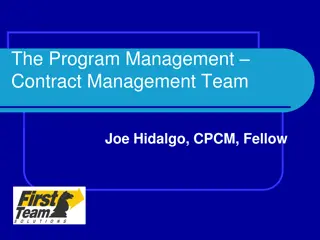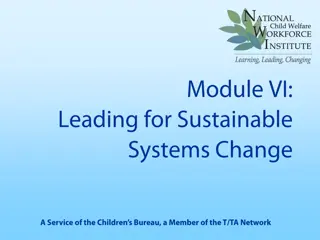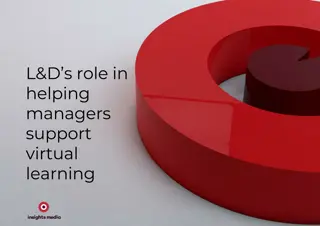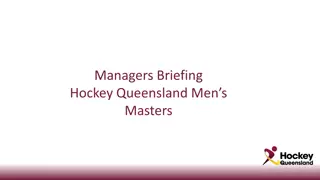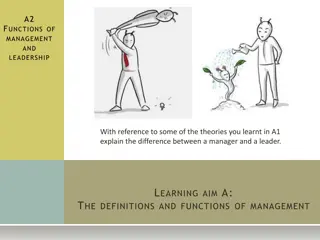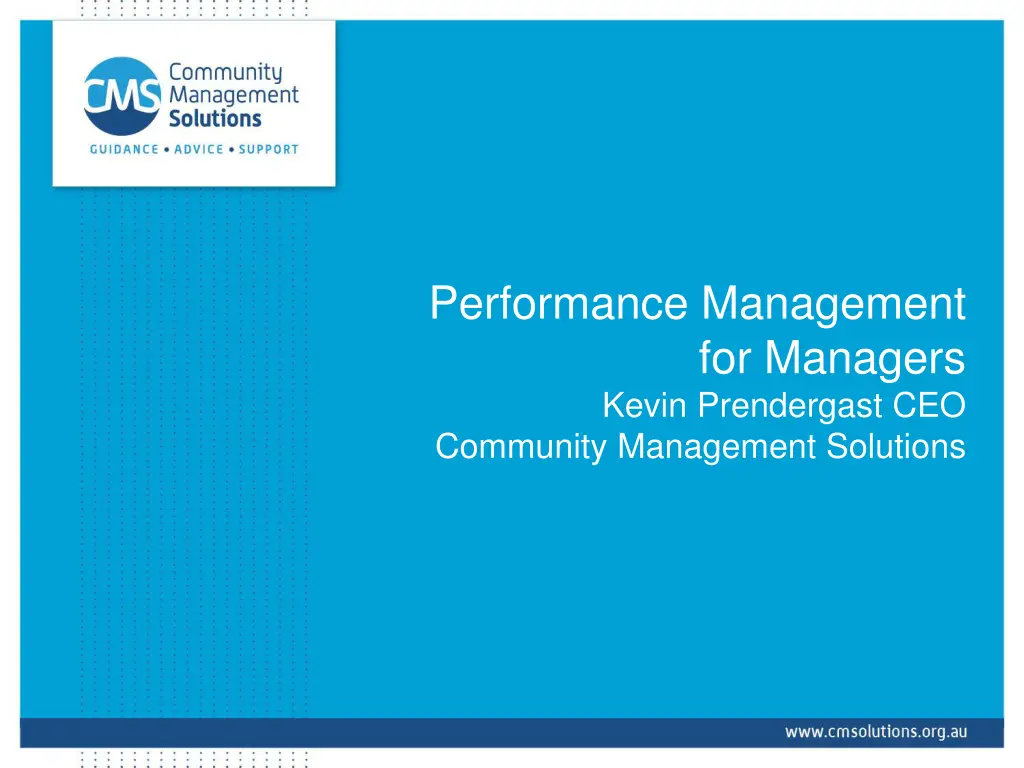
Effective Performance Management Strategies for Managers
Explore the evolution of performance management from a managerial perspective, covering both reactive and proactive strategies. Delve into the effectiveness of traditional approaches like annual performance appraisals and discover alternative methods gaining traction in modern workplaces.
Download Presentation

Please find below an Image/Link to download the presentation.
The content on the website is provided AS IS for your information and personal use only. It may not be sold, licensed, or shared on other websites without obtaining consent from the author. If you encounter any issues during the download, it is possible that the publisher has removed the file from their server.
You are allowed to download the files provided on this website for personal or commercial use, subject to the condition that they are used lawfully. All files are the property of their respective owners.
The content on the website is provided AS IS for your information and personal use only. It may not be sold, licensed, or shared on other websites without obtaining consent from the author.
E N D
Presentation Transcript
Performance Management for Managers Kevin Prendergast CEO Community Management Solutions
Community Management Solutions Welcome The objective of today's presentation is to look at Performance Management from a Managers perspective and cover both reactive and pro- active strategies within the workplace. Let's being by looking at the traditional understanding of reactive strategies including punitive performance management action, and also the performance appraisal process and if this is antiquated.
The Performance Appraisal System Is the performance appraisal system antiquated. (discussion) Traditionally we have all been involved in the process of an annual or similar review of a person's performance to determine how they have performed their role over the preceding 12 month period. In fact, we have a webinar on how to conduct the review and the benefits of this process when done correctly.
Performance Appraisal I am of the view that there is still room within the performance management process for the annual review but unfortunately it is often done haphazardly with little thought process and not seen as a priority within the workplace. It has also attracted negative connotations, but this is because in the way that it has been communicated and supported by management. Managers need to be trained extensively in how to conduct performance appraisals and if this is not done then we get a great deal of inconsistencies across the organization.
Performance Appraisals We need to be extremely aware of the staff members perception of the review. Emphasize their contribution to the review. Display active listening. Do our preparation prior to the review. Express and support its importance. Book in the review and maintain timelines. Use it as a true learning experience both ways. Not be afraid of having difficult conversations. Have the skills to make it a worthwhile and valuable experience. Do not overpromise and under deliver. Train your staff in how to use the document and have it supported by policies and procedures. Be aware of recency bias, inconsistences, objectional standards, halo and horns and unfair comparisons and also personal harshness. (discuss)
The move away from performance appraisals Some major companies and organizations worldwide have made a decision to move away from the traditional annual review. Initially this decision was responded to by enormous skepticism. In the United States more than one third have now removed the annual appraisal system which has been replaced with a variety of alternative approaches including providing immediate feedback, goal planning and frequent formal and informal check ins.
The move away Some organizations have stated that they cannot afford the enormous time that is required to be taken with in some view little return on investment so hence the decision to move away from the process. Some view the annual review as being obsessed with past behaviour (that occurring in the last year) rather than current and or future behaviour. With an emphasis on roles ever changing at a dramatic rate to meet new expectations, new business goals and service delivery models by the time we review performance for the last 12 months in some cases what we are reviewing is now no longer applicable as the role has completely or substantially changed. How can you set future annual goals say for the next 12 months when the role and expectations may be different in say the next 3 months (discuss)
The employees view It is arguable that the traditional appraisal process was hated by a lot of employees and seen as punitive, a waste of time and resources and not truly an accurate reflection of their performance over the previous 12 months. One of the major complaints was that of managers being incompetent in the process, rushing through the appraisal, inconsistencies with the results, no preparation and not treating the review seriously. Statistics support this with one major survey showing 62% of participants saw no value in the review process.
What are the alternatives Considering moving to an informal flexible system of review where continuous learning and feedback is emphasized and is a living breathing document with no specific and limited timelines. Some organizations are developing a whole of organizational performance management cycle which is strategically imbedded into all facets of the organization supported by the premise of talent retention and a philosophy of continuous learning.
What does it look like There are a lot of different systems put in place by various organization's not all are identical, and a lot are a work in motion, some are a combination of a new framework whilst continuing with the traditional appraisal system as discussed. New performance cycle systems generally include: Transparent, honest, and ethical communication by management. Setting specific individual and team goals (Discuss) A continuous not an annual process. Meaningful conversations not a tick the box approach. Train your managers. Hold performance review calibration sessions. (How to measure) 360-degree assessment Take action when it is clear that someone is not delivering in their role. Show your appreciation for an employee s hard work. Forward not backward looking. How can I be better tomorrow than I was today?
Building blocks Goal setting for individuals and teams Shared ownership Improved engagement Alignment with cultural values Genuine motivation Transparency and accountability Get employee feedback on your current system Maintain a routine of feedback and check ins Lead by example Keep things positive Constructive realistic and actionable feedback without ulterior motives. Provide support for underperformance. Promote employee growth as part of your succession plan.
Reactive Performance Management Okay now we have talked about how we can put processes and systems in place to develop a whole of organizational approach to performance management which is to inspire, teach, coach, support and mentor your employees and encourage them to reach their potential within your organization. Let's now cover those situations where you are dealing with a performance management issue and how to ensure that you follow best practice in reacting to a performance management concern.
Reactive Performance Management Possible reasons for an individual's underperformance. No excuse (discuss) Deliberate inappropriate behaviour (discuss) Loss of interest and motivation (one the way out) Reaction to a perceived wrong (discuss) The person does not understand the expectations. The person does not understand the impact of their behaviour The employee is delusional but honest Personal issues that is impacting their performance (discuss) Unable to keep pace with change or technology Bullying and or Harassment Interpersonal differences/Cultural misunderstandings Lack of confidence What about a lack of team performance (discuss)
Understanding Underperformance Not completing or performing your duties (the inherent requirements of the role) to a particular or required standard which is reasonable and consistent. Negative and or inappropriate behaviour in the workplace. Failure to comply with directions, policies and or procedures. Acting inconsistently with the employer employee relationship
Address Underperformance Identify the problem and or issue look for a pattern of consistency or an isolated incident Assess and analyze what is the proportionate response, what are the options. Meet with the employee Follow procedural fairness and natural justice Remember to offer a support person Keep confidential as much as possible Do not prejudge the situation nor make any predetermined decisions. Be aware of prejudice. Be aware of any external pressures. Agree on a solution ( you may have to agree to disagree) Monitor and Review
Tips for performance meetings Please avoid industry jargon, use everyday language so not to alienate employees. Identify and promptly address issues time is of the essence to avoid escalation. Take notes document everything be meticulous in your note taking procedure. Utilize Performance Improvement Plans where appropriate (a PIP is a document that sets out what the problem is and what they need to do to improve) how can you assist as the manager to take the employee from A to B. (discuss)
Warning and Disciplinary Action Proportionate. Fair and Transparent. Same rules for everyone. No conflict of interest. An employer may make a decision based on all the evidence (facts) etc. to take some sort of disciplinary action. If a decision is made to take some form of disciplinary action, then:
Action Follow a fair process Have a valid reason (the most important element to consider) Consider seeking advice. Once and if you issue a warning: Specifically state the reason for the warning without ambiguity Remember contrary to some opinions there is no general rule that 3 warnings or 1 or 2 warnings is required before ending the employment relationship, but an employer should in most circumstances try to give the employee the opportunity to turn their behaviour around prior to taking this step.
How can we help As members, we can: Provide support advice and guidance every step of the way. Conduct investigations on your behalf Provide template letters and documents to assist you in the process Provide risk mitigation strategies for you avoid expensive legal costs, adverse publicity and an enormous amount of resource costs. Thank you for attending today and please join us for our next Webinar on Employee Induction.




